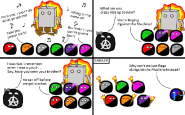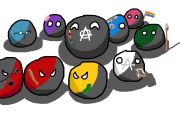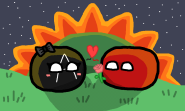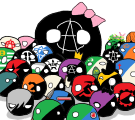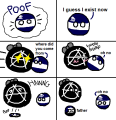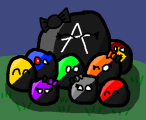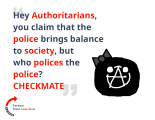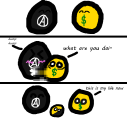imported>Man Oda254 No edit summary |
imported>TheElectricBomb |
||
| Line 356: | Line 356: | ||
===Statists=== | ===Statists=== | ||
*[[File:Fash.png]] [[Fascism]] - | *[[File:Fash.png]] [[Fascism]] - Nothing in the State, everything outside the State, everyone against the State. Now piss off! <s>I'll forget that [[File:Anfashf.png]] [[Anarcho-Fascism|he]] exists</s> | ||
*[[File:Marxlen.png]] [[Marxism–Leninism]] - I DON'T CARE IF YOU'LL "DISSOLVE", FUCK OFF! | *[[File:Marxlen.png]] [[Marxism–Leninism]] - I DON'T CARE IF YOU'LL "DISSOLVE", FUCK OFF! | ||
*[[File:Totalitarian.png]] [[Totalitarianism]] - MY ARCH-NEMESIS! (Was going to do the same with [[File:Antot.png]] [[Anarcho-Totalitarianism|them]] but too lazy.) | *[[File:Totalitarian.png]] [[Totalitarianism]] - MY ARCH-NEMESIS! (Was going to do the same with [[File:Antot.png]] [[Anarcho-Totalitarianism|them]] but too lazy.) | ||
Revision as of 05:09, 16 June 2023
Anarchism, also known as Anarchy, Anarchy without Adjectives or Mother Anarchy, is an ideology inhabiting the bottom of the political compass that advocates for a society without rulers or constituted authority, with a focus on the notion of freedom. One universal and defining aspect of anarchism is opposition to "the state" and centralized bureaucratic governance which they consider to be unjust.
Apart from this defining principle however, anarchists tend to diverge on several key issues (mostly regarding the organization of revolutionary struggle, the subject of anarchist critique and economic issues). Many ![]() left-wing anarchists consider anarchism to be in stark opposition and contrast to all vertically organized institutions (or all hierarchical institutions, basically) which manifests in various forms (
left-wing anarchists consider anarchism to be in stark opposition and contrast to all vertically organized institutions (or all hierarchical institutions, basically) which manifests in various forms (![]() opposition to the capitalist mode of production,
opposition to the capitalist mode of production, ![]() opposition to patriarchal hierarchy,
opposition to patriarchal hierarchy, ![]() opposition to anthropocentric hierarchy,
opposition to anthropocentric hierarchy, ![]() opposition to heteronormative hierarchy etc.) and support left-wing notions of freedom such as sexual liberation and class liberation whereas
opposition to heteronormative hierarchy etc.) and support left-wing notions of freedom such as sexual liberation and class liberation whereas ![]() right-wing anarchists consider anarchism to simply be the ultimate negation of the state and and bureaucracy and support certain right-wing notions of freedom such as
right-wing anarchists consider anarchism to simply be the ultimate negation of the state and and bureaucracy and support certain right-wing notions of freedom such as ![]() free trade and
free trade and ![]() freedom of the community and its culture from foreign influence. There are also
freedom of the community and its culture from foreign influence. There are also ![]() individualist anarchists who believe anarchism to believe the ideology which places the liberation of the individual as its central focus and supports ideas such as self-sufficiency (although this type of rhetoric is common on both the left and right of anarchism with most individualist anarchists, who do not believe in either left-wing or right-wing beliefs, associating with
individualist anarchists who believe anarchism to believe the ideology which places the liberation of the individual as its central focus and supports ideas such as self-sufficiency (although this type of rhetoric is common on both the left and right of anarchism with most individualist anarchists, who do not believe in either left-wing or right-wing beliefs, associating with ![]() post-left anarchism or
post-left anarchism or ![]() egoist anarchism). Ultimately, the definition of anarchism is quite loose and can be used within several contexts, which is why it is have been synthesized with most mainstream and esoteric ideologies.
egoist anarchism). Ultimately, the definition of anarchism is quite loose and can be used within several contexts, which is why it is have been synthesized with most mainstream and esoteric ideologies.
She is the mother of countless anarchist ideologies and is known to love all of her children except for some failed children. Unlike most other balls, whose gender is undefined, Anarchism is always female and wears a grey bow, as a reference to the ![]() Russo-Ukrainian anarchist song, Анархия-мама Сынов Своих Любит (Eng: Mother Anarchy Loves Her Sons).[1]
Russo-Ukrainian anarchist song, Анархия-мама Сынов Своих Любит (Eng: Mother Anarchy Loves Her Sons).[1]
History
 Proto-Anarchism
Proto-Anarchism
The etymological roots of anarchism come from Ancient Greek (as with several political vocabulary) and roughly translate to "without rulers" and has existed in the English language since 1642. Yet despite this and the fact that ![]() Pierre-Joseph Proudhon was the first to call himself an anarchist, many scholars like to envision earlier philosophies as being a sort of "proto-anarchism".
Pierre-Joseph Proudhon was the first to call himself an anarchist, many scholars like to envision earlier philosophies as being a sort of "proto-anarchism".
Some such as ![]() Harold Barclay and
Harold Barclay and ![]() David Graeber claim that before the existence of society, all humans lived in a state of anarchy (a state that would later be envisioned by
David Graeber claim that before the existence of society, all humans lived in a state of anarchy (a state that would later be envisioned by ![]() anarcho-primitivists). The ancient philosophies of
anarcho-primitivists). The ancient philosophies of ![]() Taoist sages such as
Taoist sages such as ![]() Lao Tzu and
Lao Tzu and ![]() Zhuang Zhou as well as the Greek philosophies of the
Zhuang Zhou as well as the Greek philosophies of the ![]() Cynics and the
Cynics and the ![]() Stoics have often been portrayed as anarchic by certain scholars.
Stoics have often been portrayed as anarchic by certain scholars. ![]() Aristippus, one of the pupils of
Aristippus, one of the pupils of ![]() Socrates can also be considered one of the forerunners of anarchist thought due to his beliefs about rule and autonomy.
Socrates can also be considered one of the forerunners of anarchist thought due to his beliefs about rule and autonomy.
During the Middle Ages, various theological strains of ![]() Islam and
Islam and ![]() Christianity developed that had anarchistic qualities such as the
Christianity developed that had anarchistic qualities such as the ![]() Mu'tazilite and
Mu'tazilite and ![]() Kharijites in
Kharijites in ![]() Persia (who are considered by historian
Persia (who are considered by historian ![]() David Goodway to be a part of the historical anarchist tradition) and anticlerical movements such as the
David Goodway to be a part of the historical anarchist tradition) and anticlerical movements such as the ![]() Brethren of the Free Spirit and proto-Protestants such as the
Brethren of the Free Spirit and proto-Protestants such as the ![]() Hussites. Historian
Hussites. Historian ![]() James Joll describes this as the rise of a strand of anarchism based in the theological, zealotic and ascetic critique of institutions.
James Joll describes this as the rise of a strand of anarchism based in the theological, zealotic and ascetic critique of institutions.
The early modern era in Europe saw the development of both secular anti-authoritarian thought as well as the divergence of anti-authoritarian theology within Christianity as part of the greater ![]() Renaissance and
Renaissance and ![]() Reformation respectively. Several French thinkers used the concept of 'utopia' to bypass censorship and project their libertine political views, examples include
Reformation respectively. Several French thinkers used the concept of 'utopia' to bypass censorship and project their libertine political views, examples include ![]() François Rabelais,
François Rabelais, ![]() Gabriel de Foigny and
Gabriel de Foigny and ![]() François Fénelon. During the English Civil War, Diggers such as
François Fénelon. During the English Civil War, Diggers such as ![]() Gerrard Winstanley would develop a proto-communalistic view of society preaching values such as absolute egalitarianism, communal ownership of property and socioeconomic organization in small agrarian communities based on the Bible. Alongside this religious egalitarianism, more libertarian philosophers such as
Gerrard Winstanley would develop a proto-communalistic view of society preaching values such as absolute egalitarianism, communal ownership of property and socioeconomic organization in small agrarian communities based on the Bible. Alongside this religious egalitarianism, more libertarian philosophers such as ![]() Jean-Jacques Rousseau would go on to develop understandings of freedom and equality that would strongly resonate with later anarchists.
Jean-Jacques Rousseau would go on to develop understandings of freedom and equality that would strongly resonate with later anarchists.
WIP
The start of the Anarchist Theory
Anarchism has been used as a term a long time ago, and used to mean simply "without rulers", deriving from the greek word ἀναρχος (anarkhos), with great emphasis on its use during the French Revolution by ![]() Robespierre to disqualify more radical groups like the
Robespierre to disqualify more radical groups like the ![]() enragés, a group which inspired
enragés, a group which inspired ![]() Socialism as a whole, but the term had mostly a negative connotation.
The ideology took shape after
Socialism as a whole, but the term had mostly a negative connotation.
The ideology took shape after ![]() Pierre-Joseph Proudhon self proclaimed himself as an anarchist formally, and because of the word's ambiguity, based his theory on organizing a society based on
Pierre-Joseph Proudhon self proclaimed himself as an anarchist formally, and because of the word's ambiguity, based his theory on organizing a society based on ![]() Anti-Authoritarianism and
Anti-Authoritarianism and ![]() Socialism, and although he had differences with
Socialism, and although he had differences with ![]() later Anarchists ideologies (a lot because of his emphasis on
later Anarchists ideologies (a lot because of his emphasis on ![]() Market Socialism and
Market Socialism and ![]() individualism), still he laid the basic foundations of Anarchism.
During the XVII century, different branches truly developed even more the ideology, to the way we're accustomed to in the Modern Age, Anarchism took two different paths, a more
individualism), still he laid the basic foundations of Anarchism.
During the XVII century, different branches truly developed even more the ideology, to the way we're accustomed to in the Modern Age, Anarchism took two different paths, a more ![]() Marxist analysis, with notable names like
Marxist analysis, with notable names like ![]() Mikhail Bakunin and the
Mikhail Bakunin and the ![]() Anarcho-Collectivism,
Anarcho-Collectivism, ![]() Piotr Kropotkin and
Piotr Kropotkin and ![]() Errico Malatesta with
Errico Malatesta with ![]() Anarcho-Communism and the
Anarcho-Communism and the ![]() Social Anarchism umbrella term, for the more collectively minded anarchists ideologies, in contrast with the
Social Anarchism umbrella term, for the more collectively minded anarchists ideologies, in contrast with the ![]() individually minded anarchists such as
individually minded anarchists such as ![]() Benjamin Tucker and
Benjamin Tucker and ![]() Lysander Spooner, marking as well economical differences, between
Lysander Spooner, marking as well economical differences, between ![]() Left-Wing Market Anarchism, or
Left-Wing Market Anarchism, or ![]() Mutualism and
Mutualism and ![]() Gift Economy, and sparkling the first forms of
Gift Economy, and sparkling the first forms of ![]() Right-Anarchism in the end of the century, inspired by
Right-Anarchism in the end of the century, inspired by ![]() Austrian School,
Austrian School, ![]() Chicago School and
Chicago School and ![]() Libertarianism in general, as infamously
Libertarianism in general, as infamously ![]() Anarcho-Capitalism.
Anarcho-Capitalism.
Anarchist Actions History
Anti-Capitalist or Not?
The first individuals to describe themselves as Anarchists without adjectives were thoroughly anti-capitalist, with Anarchist without Adjectives Voltairine de Cleyre saying in 1907:
The hells of capitalism create the desperate; the desperate act - desperately!
Malatesta, Errico, "Towards Anarchy" in: Turcato, Davide (ed.) 2014, "The Method of Freedom, AK Press, pp. 299
But it's important to take into consideration the meaning of the terms employed. Voltairine, after all, also said:
(Anarchists) are firm in the idea that the system of employer and employed, buying and selling, banking, and all the other essential institutions of Commercialism, centred upon private property, are in themselves good, and are rendered vicious merely by the interference of the State.
Voltairine de Cleyre, Anarchism. Originally published in Free Society, 13 October 1901. Published in Exquisite Rebel: The Essays of Voltairine de Cleyre, edited by Sharon Presley, SUNY Press 2005, p. 224.
However historical context is necessary, as these statements predate modern ![]() Anarcho-Capitalism, and with modern Anarchists without adjectives such as Fred Woodworth instead saying:
Anarcho-Capitalism, and with modern Anarchists without adjectives such as Fred Woodworth instead saying:
I have no prefix or adjective for my anarchism. I think syndicalism can work, as can free-market anarcho-capitalism, anarcho-communism, even anarcho-hermits, depending on the situation.
Fred Woodworth, An essay by Fred Woodworth in Avrich, Paul (2006). Anarchist Voices. Stirling: AK Press. p. 475.
Personality and Behaviour
Anarchy is a mother and therefore portrays quite motherly traits within the comics, but because she is anarchist, she can be quite lax in her parenting.
How to Draw

- Draw a ball,
- Fill it with dark, but not pure, black,
- Draw a white circle with an 'A' in the middle,
- Add a grey bow to the top,
- Add the eyes, and you're done!
| Color Name | HEX | RGB | |
|---|---|---|---|
| Black | #202020 | 32, 32, 32 | |
| White | #FFFFFF | 255, 255, 255 | |
| Grey | #434343 | 67, 67, 67 | |
International Relations
Since world doesn't have any ![]() worldwide government, many theorists of international relations studies use the word anarchy to describe the order of the international system—independent states with no central authority above them. On this foundation was developed 4 schools of thought:
worldwide government, many theorists of international relations studies use the word anarchy to describe the order of the international system—independent states with no central authority above them. On this foundation was developed 4 schools of thought: ![]() Realism,
Realism, ![]() Neorealism,
Neorealism, ![]() Liberalism,
Liberalism, ![]() Neoliberalism.
Neoliberalism.
Relationships
Friendly (literally every anarchist)
- Mother Anarchy loves















































 ,
,  and the rest of her children.
and the rest of her children.  Autarchy - Even though you are not going as far as me, you're still my bestie.
Autarchy - Even though you are not going as far as me, you're still my bestie. Mutualism - Dad, the original anarchist! <3 <3 <3
Mutualism - Dad, the original anarchist! <3 <3 <3 Anti-Authoritarianism - A great moderate friend of mine.
Anti-Authoritarianism - A great moderate friend of mine. Direct Democracy - Best form of democracy.
Direct Democracy - Best form of democracy. Democratic Confederalism - Non-anarchist but I support him in Syria.
Democratic Confederalism - Non-anarchist but I support him in Syria. Diggerism - You fought the state, inequality, and clergy.
Diggerism - You fought the state, inequality, and clergy. Neozapatismo - You did good work in Mexico.
Neozapatismo - You did good work in Mexico. Platformism - Your organization's obsession is cancer but Makhnovia was based.
Platformism - Your organization's obsession is cancer but Makhnovia was based.
Frenemies
 All libertarian ideologies
All libertarian ideologies  - Distrust of the state? Good, but why do you want to keep it?
- Distrust of the state? Good, but why do you want to keep it? Minarcho-Socialism &
Minarcho-Socialism &  Minarchism - You hate the state even more yet you still want to keep it?
Minarchism - You hate the state even more yet you still want to keep it? Anarcho-Monarchism - My weird monarchist child.
Anarcho-Monarchism - My weird monarchist child. Hoppeanism - Even weirder monarcho-capitalist son.
Hoppeanism - Even weirder monarcho-capitalist son. Anarcho-Fascism - What!?
Anarcho-Fascism - What!? Federalism &
Federalism &  Confederalism - Every local town, city, commune, etc. should have self-determination, but become anti-authority as a whole and we're good.
Confederalism - Every local town, city, commune, etc. should have self-determination, but become anti-authority as a whole and we're good. Anarcho-Totalitarianism - Ok, I think this is starting to become a serious problem.
Anarcho-Totalitarianism - Ok, I think this is starting to become a serious problem. Anti-Fascism - You hate fascists, yet you don't fully embrace Anti-Authoritarianism. Curious.
Anti-Fascism - You hate fascists, yet you don't fully embrace Anti-Authoritarianism. Curious. Avaritionism - You took correct ideas, but your mental illness stands in your way to establish social bonds with other people and form a voluntary association that will help everyone in their long-term goals.
Avaritionism - You took correct ideas, but your mental illness stands in your way to establish social bonds with other people and form a voluntary association that will help everyone in their long-term goals. Soulism - Getting rid of the laws of physics?! Odd and too utopian. Also, stop being so lazy and escapist loner, and think about something more realistic.
Soulism - Getting rid of the laws of physics?! Odd and too utopian. Also, stop being so lazy and escapist loner, and think about something more realistic. Hydrarchy - You don't call yourself an anarchist, but your society really wasn't bad, to be honest.
Hydrarchy - You don't call yourself an anarchist, but your society really wasn't bad, to be honest. Anti-Japaneseism - Destroying the Japanese state? What about destroying all states? Also advocating for ethnic genocide is a pretty weird thing for an anarchist to do.
Anti-Japaneseism - Destroying the Japanese state? What about destroying all states? Also advocating for ethnic genocide is a pretty weird thing for an anarchist to do. Libertarian Possibilism - You can't abolish the state with reforms.
Libertarian Possibilism - You can't abolish the state with reforms. Mao-Spontex - Huh?
Mao-Spontex - Huh? Futurism - Oh wow, you are... certainly interesting.... why are you following me?
Futurism - Oh wow, you are... certainly interesting.... why are you following me? Marxism - You criticized me multiple times and you also kicked
Marxism - You criticized me multiple times and you also kicked  him out of the First Internationale. However, you also influenced one of
him out of the First Internationale. However, you also influenced one of  my most successful son.
my most successful son. Contrarianism - Likes to oppose the status quo like me, but for the sake of it. And I worry that you will also turn your back on me if I become the status quo too
Contrarianism - Likes to oppose the status quo like me, but for the sake of it. And I worry that you will also turn your back on me if I become the status quo too which will never happen.
Statists
 Fascism - Nothing in the State, everything outside the State, everyone against the State. Now piss off!
Fascism - Nothing in the State, everything outside the State, everyone against the State. Now piss off! I'll forget that he exists
he exists Marxism–Leninism - I DON'T CARE IF YOU'LL "DISSOLVE", FUCK OFF!
Marxism–Leninism - I DON'T CARE IF YOU'LL "DISSOLVE", FUCK OFF! Totalitarianism - MY ARCH-NEMESIS! (Was going to do the same with
Totalitarianism - MY ARCH-NEMESIS! (Was going to do the same with  them but too lazy.)
them but too lazy.) Ingsoc - DON'T TOUCH ME!
Ingsoc - DON'T TOUCH ME! Authoritarianism - FUCK OFF GOVERNMENT!
Authoritarianism - FUCK OFF GOVERNMENT! Police Statism - TAKE THE BULLET, PIG!
Police Statism - TAKE THE BULLET, PIG! 


 Autocracy - LITERAL TYRANNY!
Autocracy - LITERAL TYRANNY! American Model - The most oppressive regime in human history
American Model - The most oppressive regime in human history Kleptocracy - "No criminal enterprise in human history, an enterprise of theft, murder, and genocide has ever been successful as the state."
Kleptocracy - "No criminal enterprise in human history, an enterprise of theft, murder, and genocide has ever been successful as the state." Hobbessianism - You see the state exactly what it is, but want to keep it.
Hobbessianism - You see the state exactly what it is, but want to keep it. Ethnonationalism - I hate EthnoSTATE's!!
Ethnonationalism - I hate EthnoSTATE's!! State Liberalism - DRINK YOUR OWN CORN SYRUP!
State Liberalism - DRINK YOUR OWN CORN SYRUP! State Atheism - I don't care if you're an atheist, you're still a STATIST!
State Atheism - I don't care if you're an atheist, you're still a STATIST! Theocracies - You use religion as a tool to build oppressive cults
Theocracies - You use religion as a tool to build oppressive cults Absolute Monarchism - GUILLOTINE, NOW!
Absolute Monarchism - GUILLOTINE, NOW! Aristocracy - Kill all elites!
Aristocracy - Kill all elites! Authoritarian Capitalism - Another archenemy!
Authoritarian Capitalism - Another archenemy! Financialism - Burn all banks down!
Financialism - Burn all banks down! Cameralism - Centralized economy for state's profit? Nightmare!
Cameralism - Centralized economy for state's profit? Nightmare! Corporatocracy - Eat the molotov, pig!
Corporatocracy - Eat the molotov, pig! Fourth Theory - Totalitarian imperialist!
Fourth Theory - Totalitarian imperialist! Francoism - You killed anarchists in Spain, fascist scum!
Francoism - You killed anarchists in Spain, fascist scum! Kraterocracy - One of the most terrible ideologies.
Kraterocracy - One of the most terrible ideologies. Hive-Mind Collectivism - Same as above but with a "collective" mask
Hive-Mind Collectivism - Same as above but with a "collective" mask Kritarchy - You will not judge us!
Kritarchy - You will not judge us! Monarcho-Fascism - AAAAHHHH!!!
Monarcho-Fascism - AAAAHHHH!!! Ochlocracy - This is not anarchy, it's just tyranny!
Ochlocracy - This is not anarchy, it's just tyranny! State Capitalism - Worst economy!
State Capitalism - Worst economy! Stratocracy - NO.
Stratocracy - NO. Timocracy - Fuck landlords!
Timocracy - Fuck landlords! Centralism - Fuck centralization!
Centralism - Fuck centralization! Lys Noir - Absolutely worst fake anarchist, the only thing I can consider anarchist in your ideology is decentralization.
Lys Noir - Absolutely worst fake anarchist, the only thing I can consider anarchist in your ideology is decentralization. Odalism - At least you don't call yourself an anarchist like the guy above.
Odalism - At least you don't call yourself an anarchist like the guy above. Illuminatism - Anarchism worked on a grand scale, how many more people do I need to unite to prove you wrong?
Illuminatism - Anarchism worked on a grand scale, how many more people do I need to unite to prove you wrong? Kakistocracy - THIS IS WHAT EVERY GOVERNMENT BOILS DOWN TO!
Kakistocracy - THIS IS WHAT EVERY GOVERNMENT BOILS DOWN TO! People who never read any of my philosophers think I'm you.
Further Information
Literature
- What is Property? by Pierre-Joseph Proudhon
- An Anarchist FAQ
- Anarchy by Errico Malatesta
- Enquiry Concerning Political Justice by William Godwin
- The Problem of Political Authority by Michael Huemer
- Tao Te Ching by Laozi
- Homage to Catalonia by George Orwell
- Down and Out in Paris and London by George Orwell
- Civil Disobedience by Henry David Thoreau
- The Kingdom of God is Within You by Leo Tolstoy
- A People's History of the United States by Howard Zinn
- V for Vendetta by Alan Moore
- Critique of Democracy by Moxie Marlinspike and Windy Hart
 Wikipedia
Wikipedia
 Anarchism without adjectives
Anarchism without adjectives- Anarchism
- Anarchy
- Outline of Anarchism
- Anarchist Schools of Thought
- Issues in Anarchism
- History of Anarchism
- Anarchist Economics
- List of Anarchist Movements by Region
- Stateless Society
- Spontaneous Order
Videos
- Various schools of Anarchism explained with tacos by Srsly Wrong
- Alan Moore on Anarchism
- A Conversation With Anarchist David Graeber
- Chomsky explaining real anarchism
- POST-CAPITALISM: A Detailed Look at How It Could Work by LuckyBlackCat
 YouTube Channels
YouTube Channels
 Anarco Cabritinho
Anarco Cabritinho 

 Anarco Individualismo
Anarco Individualismo 
 Anark
Anark 
 Antimídia
Antimídia 
 Andrewnism
Andrewnism 
 Binho Silver - AnarcoBall
Binho Silver - AnarcoBall 
 Canal do Betão
Canal do Betão 
 LuckyBlackCat
LuckyBlackCat 
 O Mutualista
O Mutualista 
 Spookast
Spookast 
 Thought Slime
Thought Slime 

 Zoe Baker
Zoe Baker 
Online Communities
- r/Anarchism
- r/Anarchy101
- DebateAnarchy
- r/NoRules
 2b2t (Minecraft server)
2b2t (Minecraft server) 4Chan/8Chan (Before /Pol)
4Chan/8Chan (Before /Pol)
International Organizations
Gallery
-
-
-
-
-
-
-
-
-
-
-
-
-
-
-
-
-
-
-
-
-
Credit:
 Andalusian Union, Source
Andalusian Union, Source
| | |
| File:FPCB Reform.png FreePCB Reformism • | |
